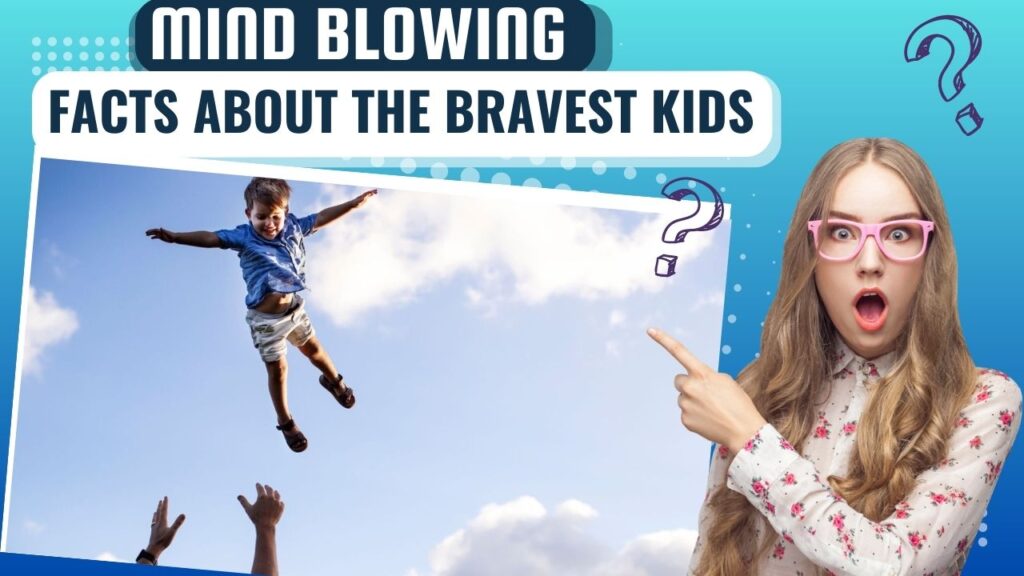
There is no one standard for what constitutes bravery; in fact, it is frequently the most impressionable among us who perform the most incredible acts of bravery. In this article, we will examine the harrowing experiences of some truly remarkable children who have demonstrated extraordinary bravery in the face of adversity. Their stories are sure to inspire and motivate you. These young heroes have already left a significant mark on the world, and they continue to motivate others with the unyielding spirit they have displayed throughout their lives. Let’s delve into the most astounding information there is to learn about the most bravest kids.
Introduction
The ability to confront and triumph over one’s fears in order to act courageously and do what is right, despite the dangers that may be involved, is the essence of bravery. It is a quality that has no age restrictions, and throughout history, we have seen bravest kids who defy the odds. In other words, bravery is not age dependent. These brave individuals are proof that one’s age need not be a limiting factor when it comes to making a difference in the world.
Definition of Bravery
It is essential that we have a firm grasp on the meaning of bravery before delving into the inspiring accounts of children who have displayed extraordinary bravery. The ability to act despite one’s fears is the essence of bravery, not the absence of fear itself. It requires meeting challenges head-on, taking a stand for what you believe in, and having a positive influence on the lives of those around you.
Extraordinary Acts of Bravery by Kids

Kids Who Saved Lives
Children have shown an incredible amount of bravery and selflessness on multiple occasions, when they have stepped forward to save lives. These young heroes have displayed an extraordinary level of bravery and quick thinking in a variety of situations, including rescuing a friend from a burning building and providing CPR to a member of their own family.
Kids Who Overcame Challenges
Some children are forced to contend with extremely difficult circumstances at a young age and exhibit remarkable bravery as a result of their success in overcoming those difficulties. These children exhibit a resilience and an unwavering spirit that inspires each and every one of us, despite the fact that they are battling a serious illness, a physical disability, or personal hardships.
Kids Who Stood Up for What They Believe In
Being able to stand up for one’s beliefs regardless of the resistance one encounters is another manifestation of bravery. Young activists all over the world have bravely fought for causes that are important to them, such as the protection of human rights and the environment and the promotion of equality. These brave people defy attempts to silence them and leave an indelible mark on society through their advocacy.
You May Also Like: 5 Most Unusual Foods That Only Exist In China
Inspiring Stories of Bravest Kids

Let’s take a look at some truly inspiring accounts of children who have won the admiration and respect of people all over the world through their extraordinary bravery:
Emma González: Fighting for Gun Control

Emma González, a student at Marjory Stoneman Douglas High School who survived the shooting that took place there in 2018, has become a powerful advocate for more stringent gun control laws in the United States. Her impassioned speech calling for action, as well as her participation in the “March for Our Lives” movement, sparked the beginning of a national dialogue on the topic of preventing gun violence and inspired an entire generation.
Malala Yousafzai: Championing Girls’ Education

Malala Yousafzai, a female education activist from Pakistan, was only 15 years old when the Taliban attempted to kill her in an attempt to silence her activism. Malala Bhutto continued her campaign for girls’ education around the world despite being targeted in the attack. As a result of her unflinching bravery and tireless advocacy work, she became the youngest person to ever be awarded the Nobel Peace Prize.
Ryan Hickman: Environmental Activist at a Young Age

Ryan Hickman launched his very own recycling company when he was just 10 years old and to this day has recycled more than one million bottles and cans. The ability of a young mind to make a significant impact on the world is demonstrated by his enthusiasm for the preservation of the natural world and his entrepreneurial drive.
Om Prakash Gurjar: The Youngest Mountaineer

At the age of 11, Om Prakash Gurjar, a boy from Rajasthan in India, became the youngest person to climb to the summit of Mount Stok Kangri, which is located at an altitude of 6,000 metres. The courage and resiliency of young mountaineers is exemplified by the young climber’s doggedness, physical endurance, and enthusiasm for new experiences.
You May Also Like: 8 Most Magical Places on Earth You Won’t Believe Exists
The Importance of Encouraging Bravery in Children

It is essential for the growth and development of children’s personalities to assist them in becoming brave. We give children the ability to face challenges, pursue their dreams, and make positive contributions to society by instilling in them a sense of courage and resilience and encouraging them to do so. In addition to helping children develop essential life skills like problem-solving and decision-making, encouraging bravery also helps children develop empathy for others.
How to Nurture Bravery in Kids
Instilling bravery in children is largely the responsibility of their parents and other primary carers. The following are some methods that can be utilized to assist in the development of bravery in young minds:
Encouraging Independence
The development of children’s self-confidence and self-assurance can be aided by permitting age-appropriate risk-taking and encouraging independent decision-making. Parents can instill a sense of bravery in their children and equip them with the skills necessary to overcome challenges by encouraging their children to develop their independence.
Teaching Resilience
Building bravery requires a significant amount of resilience on the part of the individual. Parents can help their children develop resilience by instructing them in how to recover from setbacks, by reinforcing the value of perseverance, and by pointing out the valuable life lessons that can be gleaned from trying circumstances.
Promoting Empathy and Kindness
Being courageous is about more than just achieving one’s own goals; it also involves showing empathy and kindness towards other people. Parents can instill in their children a sense of compassion and encourage acts of bravery that are beneficial not only to the individual but also to the community at large by teaching their children to understand and care about the emotions of others.
You May Also Like: 5 Most Unusual Foods That Only Exist In China
Conclusion
The accounts of these courageous children serve as a timely reminder that one’s age need not be a prerequisite for bravery. These young heroes are an inspiration to us all, whether it be through the saving of lives, the fighting for a cause, or the overcoming of personal challenges. It is critical to instill courage in children, and if we do so by giving them the appropriate support and encouragement, we can assist them in realising their full potential and having a positive effect on the world.
Few More Queries
- Can bravery be taught?
While some individuals may naturally possess a brave disposition, bravery can also be nurtured and developed through experiences, role models, and supportive environments. With the right guidance and encouragement, children can learn to embrace bravery in their lives.
- How can parents support and encourage bravery in their children?
Parents can support and encourage bravery in their children by providing a safe and nurturing environment, fostering independence, teaching resilience, and promoting empathy and kindness. It’s important to celebrate and acknowledge acts of bravery, no matter how small, to reinforce their importance.
- Are there any risks associated with encouraging bravery in kids?
Encouraging bravery in kids should be balanced with ensuring their safety and well-being. It’s important for parents to assess risks appropriately and provide guidance and supervision when necessary. Open communication and ongoing support are crucial to helping children navigate challenges safely.



